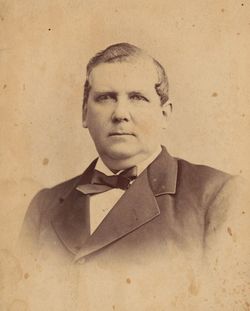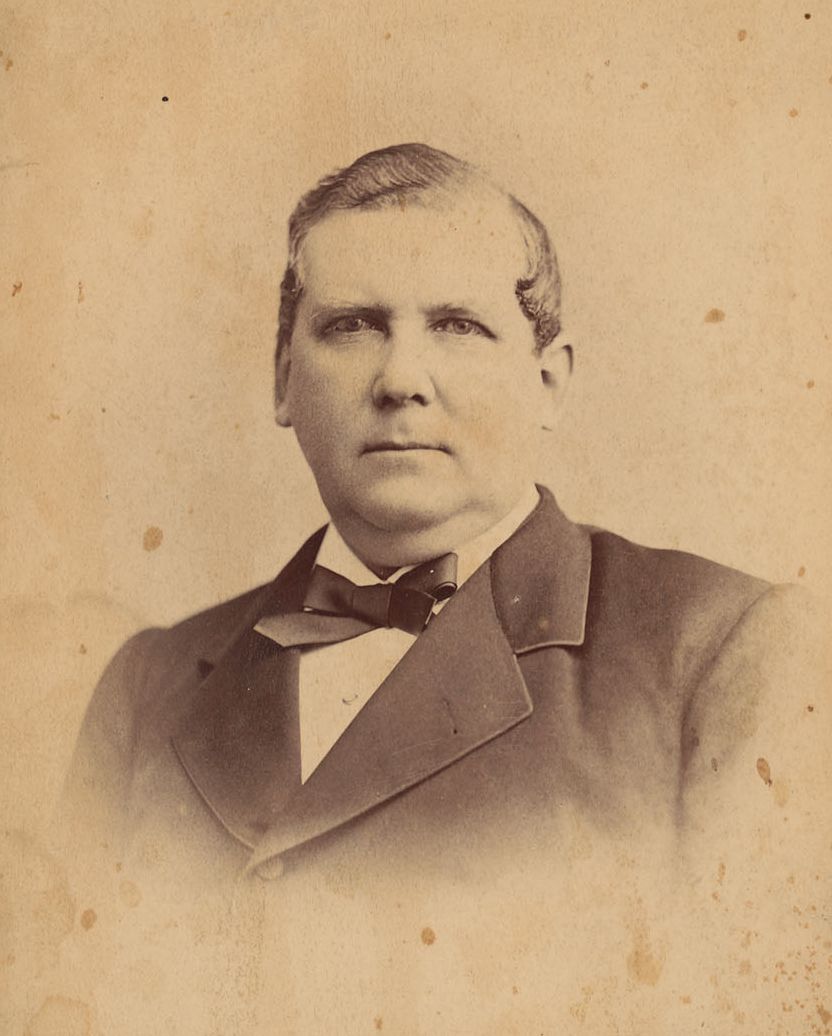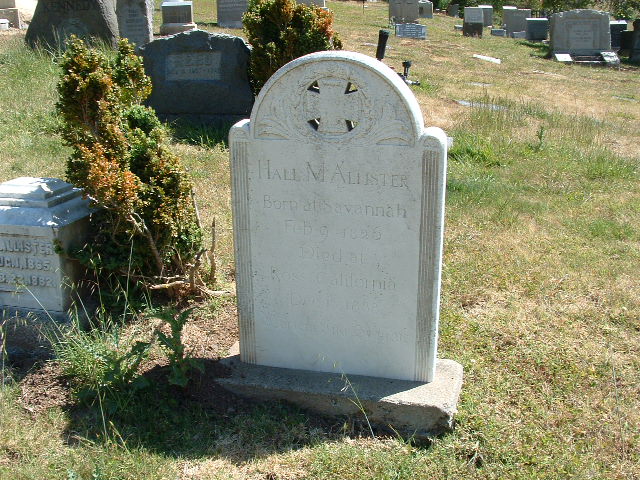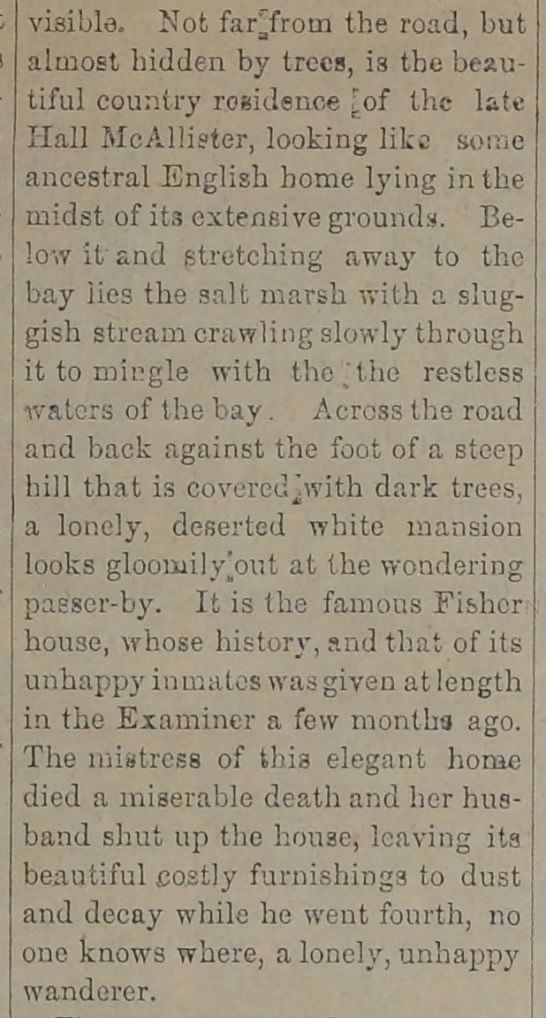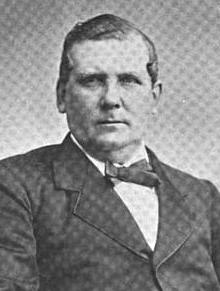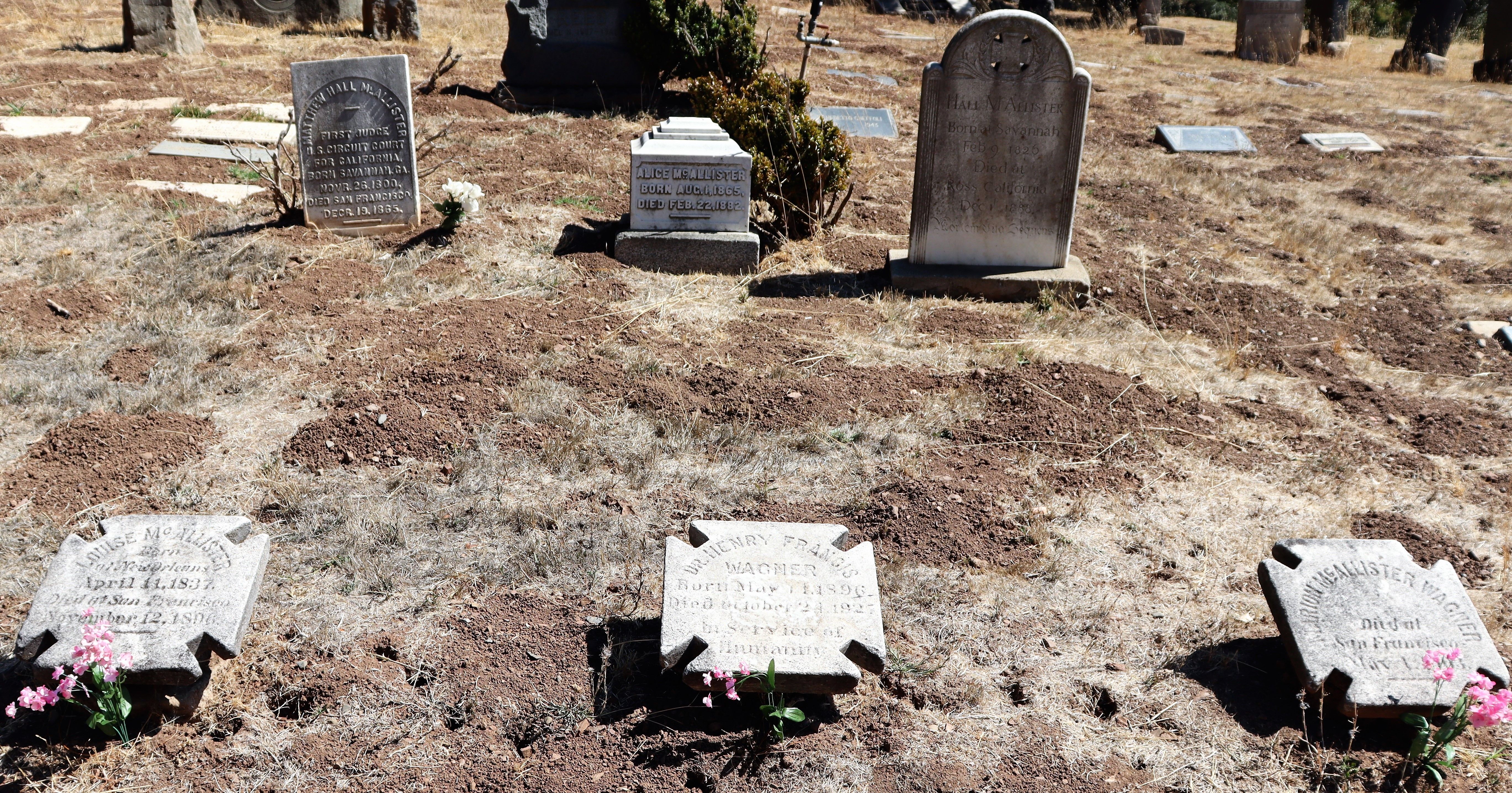In May 1846, McAllister entered Yale College with the class of 1849 but withdrew during his sophomore year, in July 1847, studied law in Savannah, was admitted to the bar, probably in January 1849, and soon afterward sailed for California with his cousin, Samuel Ward.
McAllister arrived in San Francisco on June 4, 1849, in company with W. M. Gwin and Joseph Hooker, and he immediately engaged in law practice. In September he became second lieutenant of the California Guards, a military company organized to assist in the maintenance of law and order. Upon the arrival, in 1850, of his father and brother, Samuel Ward McAllister, the three McAllisters formed a law partnership that continued until Ward's withdrawal and the father's elevation to the bench. As assistant to Horace Hawes, in 1850, he was active in apprehending and bringing to trial and conviction, before the unofficial court that had been set up, a band of desperate characters first known as the Hounds and later as the Regulators. The organization and methods of the vigilance committee the next year, however, seem not to have enlisted his approval or cooperation. He seems to have eschewed politics throughout most of his career. In 1860, however, he was one of sixty-five signers of an address to California Democrats declaring their support of the Breckinridge ticket. He did not confine his talents to any particular kind of legal practice. He was most at home before a jury, where his sense of humor often led him to inject into his arguments doggerel of his own composition. When trying a case, he habitually took down the testimony of witnesses himself, in spite of the fact that the court stenographer was doing this at the same time. The actual trial lasted for many months in the lower courts, and his argument required seventeen days for delivery. Two years after his death, the California supreme court sustained his victory in the trial court. In the summer of 1888 he became ill and went to Europe for several months in the hope of recovery. Returning in November, he died a month later of a brain tumor, at his country estate "Miramonte" in Ross Valley, near San Rafael, and was buried from Trinity Episcopal Church in San Francisco.
McAllister's courtly manners and popular personality, his character, and intellectual abilities soon brought him a large and lucrative law practice. Although not remarkable as a speaker, he had a convincing way with a jury, growing out of the thorough preparation and mastery of his cases. His name constantly appears in the seventy-odd volumes of California's supreme court reports published during his lifetime, beginning with the case of Payne vs. The Pacific Mail Steamship Co. in the first volume. Resolutions adopted by the bar association of San Francisco shortly after his death declared that he had tried more cases, won more verdicts, and received larger fees than any other California lawyer of the period.
McAllister was survived by his wife, Louisa Clemence (Hermann) McAllister, the daughter of Samuel Hermann of San Francisco, and by four children, three daughters and a son.
Father: Matthew Hall McAllister 26 November 1800 - 19 December 1865
Mother: Louisa Charlotte Cutler McAllister 13 March 1801 - 13 February 1869
Brother: Ward M. McAllister 1827 - 31 January 1895
Brother: Col Julian McAllister 29 October 1823 - 3 January 1887
Wife: Louise Clemence Hermann McAllister 11 April 1837 - 12 November 1896
Daughter: Eva McAllister Pritchett 30 November 1870 - 15 September 1956
Daughter: Marion McAllister Wagner May 1860 - 1 May 1906
Daughter: Edith McAllister Newlands 1860 - 1939
Son: Hall McAllister III 27 February 1863 - 1 April 1923
References:
Bench and Bar in California: History, Anecdotes, Reminiscences
Society as I Have Found It
In May 1846, McAllister entered Yale College with the class of 1849 but withdrew during his sophomore year, in July 1847, studied law in Savannah, was admitted to the bar, probably in January 1849, and soon afterward sailed for California with his cousin, Samuel Ward.
McAllister arrived in San Francisco on June 4, 1849, in company with W. M. Gwin and Joseph Hooker, and he immediately engaged in law practice. In September he became second lieutenant of the California Guards, a military company organized to assist in the maintenance of law and order. Upon the arrival, in 1850, of his father and brother, Samuel Ward McAllister, the three McAllisters formed a law partnership that continued until Ward's withdrawal and the father's elevation to the bench. As assistant to Horace Hawes, in 1850, he was active in apprehending and bringing to trial and conviction, before the unofficial court that had been set up, a band of desperate characters first known as the Hounds and later as the Regulators. The organization and methods of the vigilance committee the next year, however, seem not to have enlisted his approval or cooperation. He seems to have eschewed politics throughout most of his career. In 1860, however, he was one of sixty-five signers of an address to California Democrats declaring their support of the Breckinridge ticket. He did not confine his talents to any particular kind of legal practice. He was most at home before a jury, where his sense of humor often led him to inject into his arguments doggerel of his own composition. When trying a case, he habitually took down the testimony of witnesses himself, in spite of the fact that the court stenographer was doing this at the same time. The actual trial lasted for many months in the lower courts, and his argument required seventeen days for delivery. Two years after his death, the California supreme court sustained his victory in the trial court. In the summer of 1888 he became ill and went to Europe for several months in the hope of recovery. Returning in November, he died a month later of a brain tumor, at his country estate "Miramonte" in Ross Valley, near San Rafael, and was buried from Trinity Episcopal Church in San Francisco.
McAllister's courtly manners and popular personality, his character, and intellectual abilities soon brought him a large and lucrative law practice. Although not remarkable as a speaker, he had a convincing way with a jury, growing out of the thorough preparation and mastery of his cases. His name constantly appears in the seventy-odd volumes of California's supreme court reports published during his lifetime, beginning with the case of Payne vs. The Pacific Mail Steamship Co. in the first volume. Resolutions adopted by the bar association of San Francisco shortly after his death declared that he had tried more cases, won more verdicts, and received larger fees than any other California lawyer of the period.
McAllister was survived by his wife, Louisa Clemence (Hermann) McAllister, the daughter of Samuel Hermann of San Francisco, and by four children, three daughters and a son.
Father: Matthew Hall McAllister 26 November 1800 - 19 December 1865
Mother: Louisa Charlotte Cutler McAllister 13 March 1801 - 13 February 1869
Brother: Ward M. McAllister 1827 - 31 January 1895
Brother: Col Julian McAllister 29 October 1823 - 3 January 1887
Wife: Louise Clemence Hermann McAllister 11 April 1837 - 12 November 1896
Daughter: Eva McAllister Pritchett 30 November 1870 - 15 September 1956
Daughter: Marion McAllister Wagner May 1860 - 1 May 1906
Daughter: Edith McAllister Newlands 1860 - 1939
Son: Hall McAllister III 27 February 1863 - 1 April 1923
References:
Bench and Bar in California: History, Anecdotes, Reminiscences
Society as I Have Found It
Family Members
Advertisement
Advertisement
